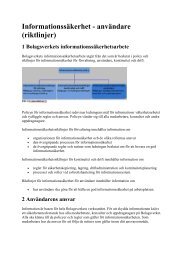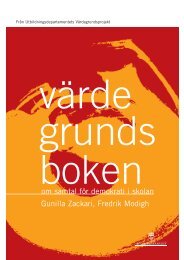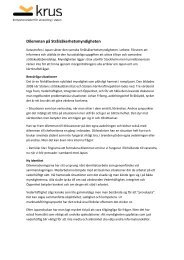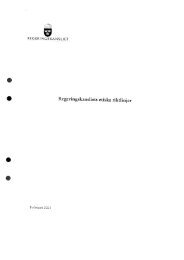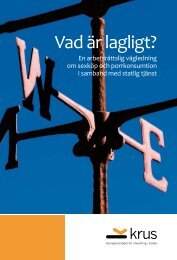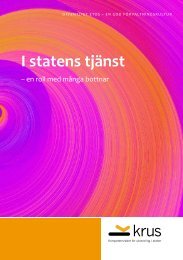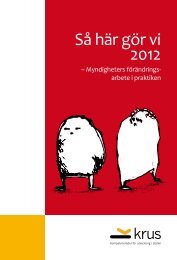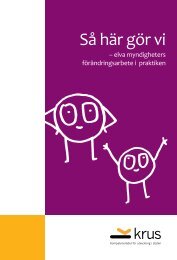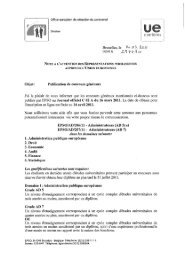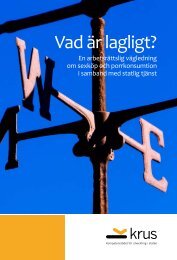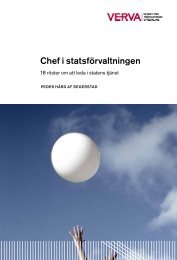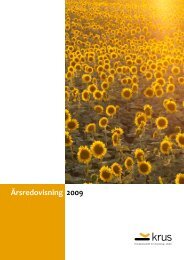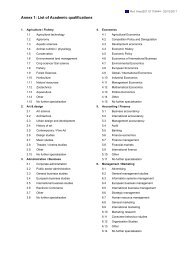Dialogkompetens i skolans vardag - Publikationer - LTU - Luleå ...
Dialogkompetens i skolans vardag - Publikationer - LTU - Luleå ...
Dialogkompetens i skolans vardag - Publikationer - LTU - Luleå ...
Create successful ePaper yourself
Turn your PDF publications into a flip-book with our unique Google optimized e-Paper software.
Educational Action Research<br />
Vol. 14, No. 4, December 2006, pp. 547–568<br />
The relation between tools used in<br />
action research and the zone of<br />
proximal development<br />
Ann-Christine Wennergren a * and Karin Rönnerman b<br />
a Luleå University of Technology, Sweden; b Göteborg University, Sweden<br />
REAC_A_197480.sgm<br />
10.1080/09650790600975791<br />
Educational 0965-0792 Original 2006 Taylor 14 4000000December Ann-ChristineWennergren<br />
acwe@ltu.se and & Article Francis (print)/1747-5074 Action 2006 Ltd Research (online)<br />
This article describes a national school improvement project involving five compulsory schools for<br />
hard-of-hearing pupils, located in different parts of Sweden. Using action research, the teachers tried<br />
to change the communication patterns among the pupils by changing their own classroom practices,<br />
In this process the teachers tested and used different tools, such as writing, shadowing and facilitating<br />
each other, over a three-year period. The purpose of this article is to examine how tools used in action<br />
research can be used to promote learning in relation to the concept of the zone of proximal development.<br />
The theoretical framework of the study is based on action research, as a collaborative way<br />
of creating knowledge, and on sociocultural learning theories. The basic assumption is that teachers,<br />
by using different tools, also challenge each other’s learning. The results show the importance of<br />
internalising tools that become owned by individuals or communities of practise. To be able to<br />
assume an active role in the zone of proximal development, and to produce knowledge collaboratively,<br />
a meaning-making process was needed. It was found that this could be realised if the participants<br />
had an awareness of how to function as a critical friend among colleagues. Furthermore, the<br />
results revealed that, by using different tools, different voices can be heard. Three categories of voices<br />
were identified.<br />
Keywords: Critical friend; Professional development; Scaffolding; Tools in action research;<br />
Voices; Zone of proximal development<br />
Introduction<br />
Over the past 15 years, teachers’ professionalism has been on the agenda. Different<br />
projects that aim to find forms of collaboration between teachers and researchers for<br />
the purpose of improving practice by utilising experiences and theories are currently in<br />
progress. One field involved in this area is action research. In their handbook on<br />
*Corresponding author. Department of Music and Media, Luleå University of Technology, Sweden.<br />
Email: acwe@ltu.se<br />
ISSN 0965-0792 (print)/ISSN 1747-5074 (online)/06/040547–22<br />
© 2006 Educational Action Research<br />
DOI: 10.1080/09650790600975791



